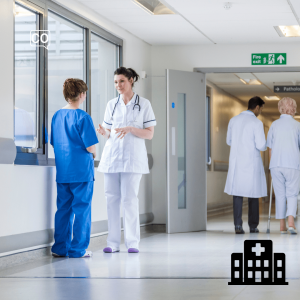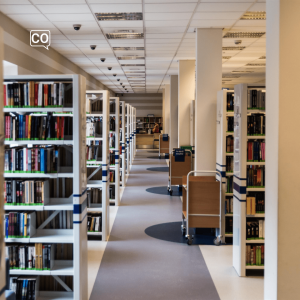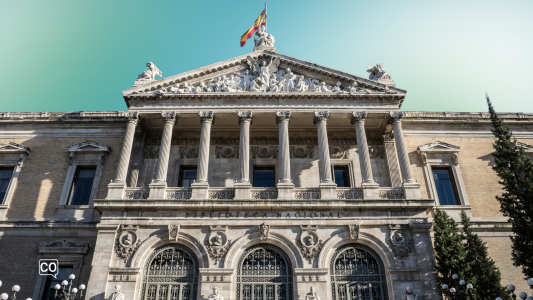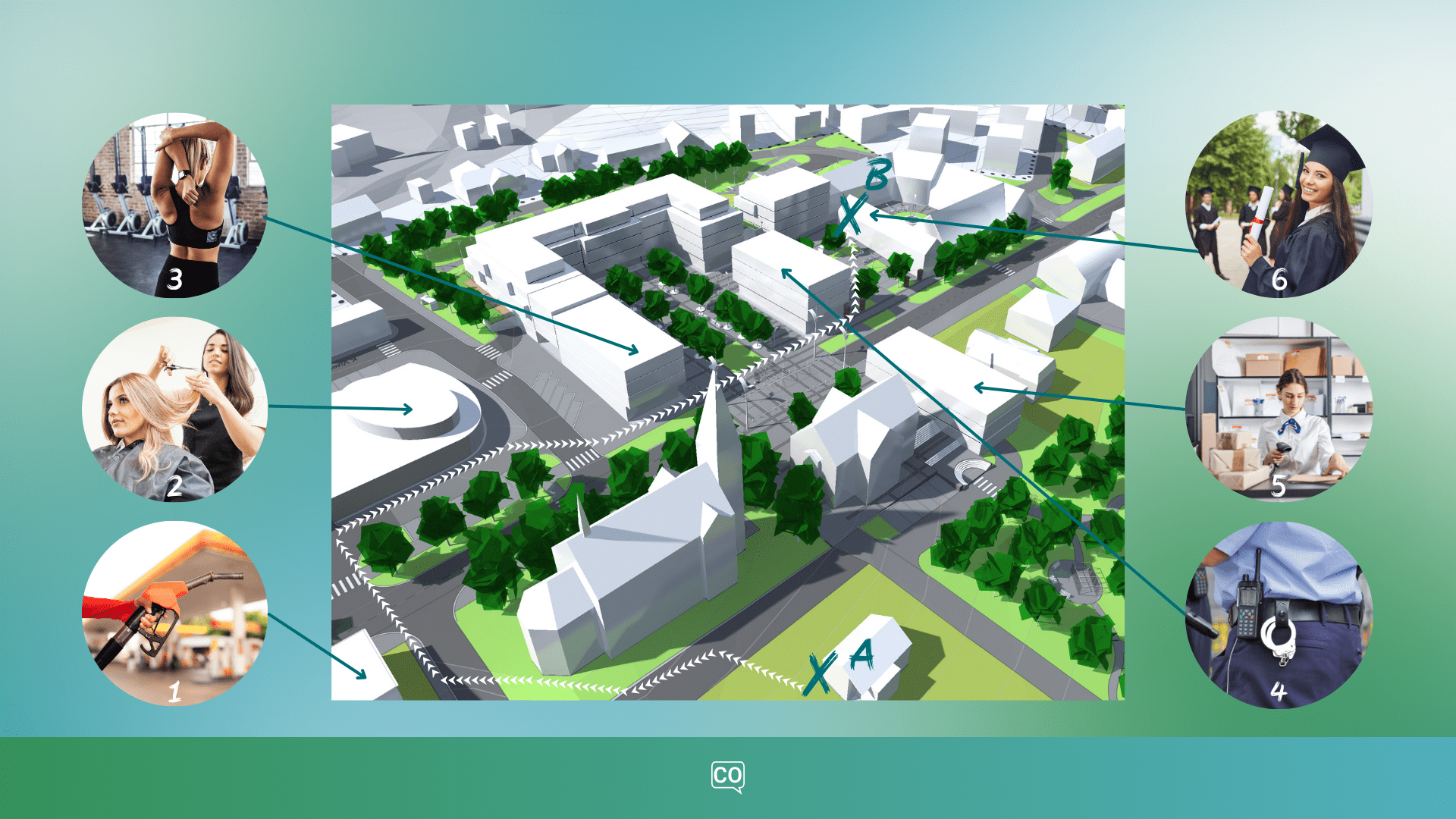Servicios cotidianos

Learning goals:
- Hablar sobre los servicios cotidianos (Talk about everyday services)
- Servicios básicos de la ciudad (Basic city services )
-
El participio como adjetivo y uso con
"estar" (The participle as an adjective and usage with "estar") - La Biblioteca Nacional de España (The National Library of Spain)
Learning module 6 (A1): La ciudad y el pueblo (The city and the village)
Recap exercises of the previous lesson
Teaching guidelines +/- 60 minutes
Core vocabulary (17)
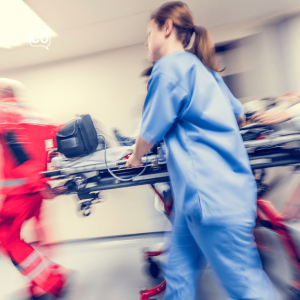
Tenemos que ir al hospital, ¡es una urgencia!
(We have to go to the hospital, it's an emergency!)
Las urgencias
(The emergencies)

La escuela está cerrada hoy porque es un día festivo.
(The school is closed today because it is a holiday.)
La escuela
(The school)

La oficina de correos está cerrada porque es domingo.
(The post office is closed because it is Sunday.)
La oficina de correos
(The post office)

La gasolinera está cerrada hoy.
(The petrol station is closed today.)
La gasolinera
(The gas station)

La comisaría siempre está abierta para emergencias.
(The police station is always open for emergencies.)
La comisaría
(The police station)

La escuela está al lado de la peluquería.
(The school is next to the hairdresser's.)
La peluquería
(The hairdresser's)

La universidad está conectada con la biblioteca a través de un pasillo.
(The university is connected to the library through a hallway.)
La universidad
(The university)
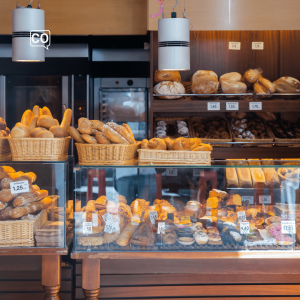
La panadería solo abre por las mañanas.
(The bakery is only open in the mornings.)
La panadería
(The bakery)

Ellos usan ropa cómoda para pasear a la mascota.
(They wear comfortable clothes to walk the pet.)
Usar
(To use)

Está sentado en el banco esperando a su amigo.
(He is sitting in the bank waiting for his friend.)
El banco
(The bank)
Listening materials
Our listening materials implement the verbs, vocabulary and grammar topics of this lesson. Audio and video available!
A1.38.1 Diálogo: Servicios en la ciudad: ¿Abierto o cerrado?
Spanish A1.38.1 Services in the city: Open or closed?
Pedro y Ana hablan sobre servicios en la ciudad y adónde quieren ir.
(Pedro and Ana talk about services in the city and where they want to go.)
Teaching guidelines +/- 15 minutes
A1.38.2 Gramática: El participio como adjetivo y uso con "estar"
Spanish A1.38.2 The participle as an adjective and usage with "estar"
(Participial adjectives are verb forms that are used as adjectives. They combine with the verb "estar" to describe temporary states or conditions.)
Teaching guidelines +/- 15 minutes
A1.38.3 Cuento corto: Un día en la ciudad
Spanish A1.38.3 A Day in the City
Una historia simple sobre un día típico en la ciudad. ¿Qué servicios están abiertos o cerrados?
(A simple story about a typical day in the city. What services are open or closed?)
Teaching guidelines +/- 15 minutes
A1.38.4 Cultura: La Biblioteca Nacional de España
Spanish A1.38.4 The National Library of Spain
La Biblioteca Nacional de España en Madrid guarda libros y documentos históricos.
(The National Library of Spain in Madrid keeps books and historical documents.)
Teaching guidelines +/- 10 minutes
Exercises
These exercises can be done together during conversation lessons or as homework.
Exercise 1: Find the words
Instruction: Find the words, mark them and make sentences with the words.
Show answers Show hintsHints
The office , The school , The gym , The university , To use , The hospital
Answers
Score: 0/6
| El gimnasio | (The gym) |
| El hospital | (The hospital) |
| La escuela | (The school) |
| La oficina | (The office) |
| Usar | (To use) |
| La universidad | (The university) |
Exercise 2: Reorder sentences
Instruction: The words in these sentences have been shuffled! Sort them so that they make a valid sentence again and translate.
Show answers Show translationExercise 3: Translate and make sentences
Instruction: Translate the words and phrases below and use it in a conversation or text.
Show answersExercise 4: Translate and use in a sentence
Instruction: Translate and say the word out loud. Use the word in a sentence.
Show translation|
1.
La farmacia
|
(The pharmacy) |
|
2.
El gimnasio
|
(The gym) |
|
3.
Usar
|
(To use) |
|
4.
Las urgencias
|
(The emergencies) |
|
5.
La panadería
|
(The bakery) |
Exercise 5: Conjugación verbal
Instruction: Choose the correct word, read the sentence out loud and translate.
Show answers Show translationUsar (Presente, indicativo), Pasar (Presente, indicativo)
1. Yo ... la computadora para trabajar.
2. Vosotros ... los días cuidando a los animales.
3. Ellos ... toda la mañana limpiando el cuarto.
4. Nosotros ... las servilletas en la mesa.
5. Tú ... una cuchara para comer la sopa.
Exercise 6: The participle as an adjective and usage with "estar"
Instruction: Choose the correct word, read the sentence out loud and translate.
Show answers Show translationpreparadas, preparado, cerradas, abierta, vendido, organizada, cerrada, alquilada
1. Cerrar: Las escuelas están ....
2. Organizar: La oficina de correos es ....
3. Vender: El coche ... pasa por la gasolinera.
4. Preparar: El hospital está ... para emergencias.
5. Preparar: Las bibliotecas están ... para el nuevo semestre.
6. Alquilar: La oficina es ....
7. Abrir: La farmacia está ... hoy.
8. Cerrar: La gasolinera está ... por la noche.
Exercise 7: Translate and make sentences
Instruction: Translate the words and phrases below and use it in a conversation or text.
Show answersConversation exercise
Teaching guidelines +/- 10 minutes
- ¿Por qué edificios pasa Angelo de camino a su graduación universitaria? (What buildings does Angelo pass by on his way to his university graduation?)
Example phrases:
- Primero pasa por la gasolinera, luego... (First he passes by the gas station, then...)
- ...
Appendix 1: Extended vocabulary table
Core vocabulary
(17):
Verbs: 2,
Nouns: 15,
Context vocabulary:
8
| Spanish | English |
|---|---|
| Abierta | Open |
| Bibliotecas | Libraries |
| El banco | The bank |
| El gimnasio | The gym |
| El hospital | The hospital |
| La biblioteca | The library |
| La cafetería | The cafeteria |
| La comisaría | The police station |
| La escuela | The school |
| La farmacia | The pharmacy |
| La gasolinera | The gas station |
| La oficina | The office |
| La oficina de correos | The post office |
| La panadería | The bakery |
| La peluquería | The hairdresser's |
| La universidad | The university |
| Las urgencias | The emergencies |
| Pasa | He/she/it passes |
| Pasamos | Shall we pass |
| Pasan | They pass |
| Pasar | To pass |
| Usa | Uses |
| Usan | They use |
| Usar | To use |
| Uso | I use |
Appendix 2: Verb conjugation tables for this lesson
Usar (to use)
Exercises and examples phrases
- yo uso I use
- tú usas you use
- él/ella usa he/she uses
- nosotros/nosotras usamos we use
- vosotros/vosotras usáis you use
- ellos/ellas usan They use
Pasar (to pass)
Exercises and examples phrases
- yo paso I pass
- tú pasas you pass
- él/ella pasa he/she passes
- nosotros/nosotras pasamos we pass
- vosotros/vosotras pasáis you pass
- ellos/ellas pasan They pass
Exercise: Verb conjugation
Instruction: Choose the correct word, read the sentence out loud and translate.
Show answers Show translationUsar (Presente, indicativo), Pasar (Presente, indicativo)
1. Yo ... la computadora para trabajar.
2. Vosotros ... los días cuidando a los animales.
3. Ellos ... toda la mañana limpiando el cuarto.
4. Nosotros ... las servilletas en la mesa.
5. Tú ... una cuchara para comer la sopa.
